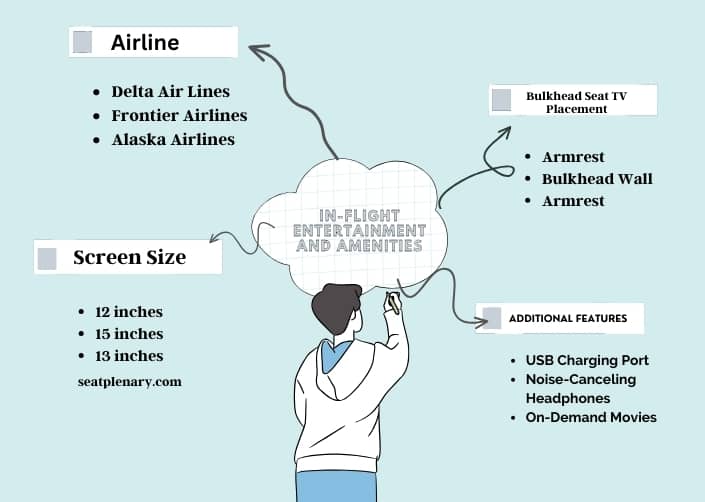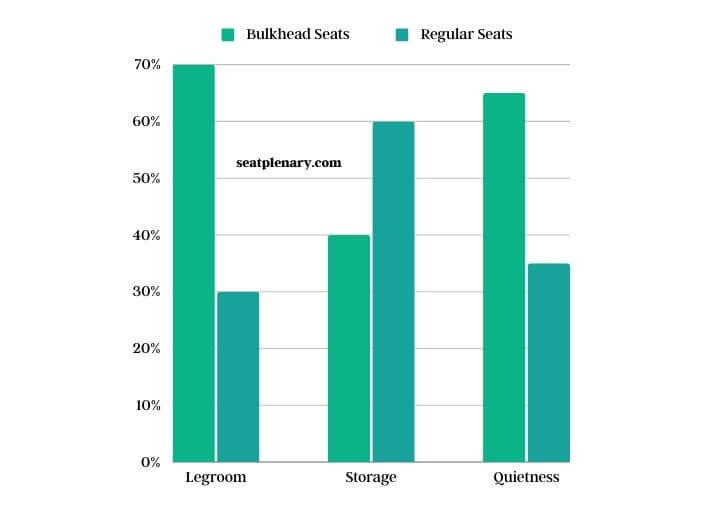A bulkhead seat is a specific type of seat found on airplanes, typically located at the division between different sections of the cabin. These seats are adjacent to a bulkhead, the dividing wall or partition within the aircraft’s interior.
Bulkhead seats in business class offer distinct advantages, including additional legroom due to the absence of seats directly in front. This extra space is particularly beneficial for taller passengers or those who prefer more room to stretch out during a flight. In the context of a bulkhead seat on a plane, it’s also worth noting that these seats often provide a quieter environment, as they are usually situated away from the bustling central aisles.
When considering whether a bulkhead seat is better, it’s essential to weigh the pros and cons. One significant advantage is the increased space, which can enhance comfort, especially on long flights. For passengers traveling with a baby, bulkhead seats are often preferred as they provide room for a bassinet. On the downside, these seats may lack under-seat storage space during takeoff and landing, requiring overhead bin use for personal items.

Regarding in-flight entertainment, bulkhead seats often have TV screens mounted on the bulkhead itself or deployable from the armrest, ensuring passengers have access to the same entertainment options as others. However, it’s crucial to check with the specific airline, as configurations can vary.
One common question is whether bulkhead seats recline. The answer varies by aircraft and airline, but generally, these seats do have reclining capability, albeit sometimes slightly less than other seats due to their proximity to the bulkhead.
In summary, bulkhead seats offer a unique set of features that can significantly enhance the flying experience, particularly in terms of space and comfort. For a more detailed insight into bulkhead seats, including specific airline configurations and additional benefits, you are invited to read the detailed article below.
Bulkhead Seats in Air Travel – An In-Depth Analysis
Defining Bulkhead Seats
Concept and Location in Aircraft
Let’s kick things off by getting to know what bulkhead seats are all about. Picture yourself boarding a plane; you’ll notice these seats right at the front of a section, usually just behind physical partitions known as bulkheads. These partitions can be walls, curtains, or screens, separating classes or sections within the plane. Initially, bulkhead seats were merely a structural necessity, but over time, they’ve evolved into a sought-after seating choice for many travelers.
Evolution of Bulkhead Seats Over Time
Bulkhead seats have come a long way! In the early days of flying, these seats were more about function than comfort – think of them as just another row. But as air travel became more popular, airlines started seeing the potential in these seats. They began tweaking the design, adding more legroom, and making them a premium option. It’s a classic case of an accidental discovery turning into a passenger favorite.
Design and Features of Bulkhead Seats
Physical Attributes
Now, let’s talk design. Bulkhead seats are known for their spacious legroom, thanks to the absence of seats directly in front of them. This extra space is a game-changer, especially on long flights. But it’s not all roses; these seats often lack under-seat storage, meaning you’ll have to stow your carry-on in the overhead bins during takeoff and landing.
In-Flight Entertainment and Amenities
In-flight entertainment is crucial, right? Well, bulkhead seats usually have their TV screens mounted on the bulkhead or tucked into the armrests. This setup varies across airlines, but the goal is the same – to keep you entertained up in the air.
Comparison of In-Flight Entertainment Systems Across Airlines
| Airline | Bulkhead Seat TV Placement | Screen Size | Additional Features |
| Delta Air Lines | Armrest | 12 inches | USB Charging Port |
| Frontier Airlines | Bulkhead Wall | 15 inches | Noise-Canceling Headphones |
| Alaska Airlines | Armrest | 13 inches | On-Demand Movies |

Bulkhead Seats Across Flight Classes
Economy Class Bulkhead Seats
In economy, bulkhead seats are like finding a hidden gem. They offer more legroom, which is a big deal when you’re trying to stretch out. But remember, these seats might be near the lavatories or galleys, so there’s a trade-off between space and potential foot traffic.
Business and First-Class Bulkhead Seats
Moving up to business and first class, bulkhead seats are a whole different ball game. They’re often more spacious and come with extra perks like enhanced privacy and premium service. It’s like having your little cocoon of comfort in the sky.
Features of Bulkhead Seats in Various Airline Classes
| Class | Legroom | Privacy | Additional Perks |
| Economy | High | Low | Extra Overhead Bin Space |
| Business | Very High | Medium | Lie-Flat Seats |
| First Class | Very High | High | Personal Suite |

Advantages of Choosing Bulkhead Seats
Enhanced Legroom and Space
The star of the show when it comes to bulkhead seats is undoubtedly the legroom. It’s like having your mini-stretch zone. This extra space is not just about comfort; it can be a real game-changer for tall passengers or those with mobility issues.
Privacy and Reduced Noise
Bulkhead seats often come with an added bonus – a bit more privacy and a quieter environment. Since you’re not sandwiched between rows of passengers, you get to enjoy a bit of solitude. It’s like being in your little bubble, away from the aisle bustle.
Special Benefits for Passengers with Infants
Traveling with a baby? Bulkhead seats might be your best bet. Many airlines provide bassinets that attach to the bulkhead, making it easier to manage your little one during the flight. It’s a thoughtful touch that can make a world of difference for parents.
Challenges and Limitations
Storage Space Constraints
One downside to bulkhead seats is the lack of under-seat storage. You’ll need to use the overhead bins for your belongings, which can be a bit of a hassle, especially if you need something mid-flight.
Recline Restrictions
Another thing to consider is the recline. Some bulkhead seats might not recline as much as others, given their proximity to the partition. It’s a small price to pay for the extra legroom, but worth noting for those who like to lean back and relax.
Proximity to Lavatories and Galley
Lastly, the location of bulkhead seats near lavatories and galleys can be a double-edged sword. You get more space, sure, but it might come with extra noise and foot traffic. It’s all about what you prioritize – space or peace.
Passenger Preferences and Opinions
Survey Results on Passenger Choices for Bulkhead Seats
People’s preferences vary widely when it comes to bulkhead seats. Some swear by the extra space, while others prefer the traditional rows. It often comes down to personal priorities – do you value legroom over storage, or is it the other way around?
Passenger Preference Statistics for Bulkhead vs. Regular Seats
| Preference | Bulkhead Seats | Regular Seats |
| Legroom | 70% | 30% |
| Storage | 40% | 60% |
| Quietness | 65% | 35% |

Airlines’ Strategies for Bulkhead Seating
Pricing and Seat Availability Tactics
Airlines have caught on to the popularity of bulkhead seats and often price them accordingly. Some airlines include them as a premium option, while others might offer them as a regular choice, depending on the flight and class.
Customizations Based on Aircraft Model
The design and features of bulkhead seats can vary significantly depending on the aircraft model. Airlines customize these seats to maximize space and comfort, tailoring them to the specific layout of each plane.
Frequently Asked Questions (FAQs)
Can Bulkhead Seats Be Reserved in Advance?
Yes, bulkhead seats can often be reserved in advance, but the process varies by airline. Some airlines allow these seats to be selected during the booking process, especially for frequent flyers or those traveling in higher classes. Others might reserve them for passengers with specific needs, such as those traveling with infants. It’s always a good idea to check the airline’s policy and possibly pay a premium for early selection. This way, you can ensure the extra comfort and space provided by these seats, especially on longer flights.
Are Bulkhead Seats Suitable for Tall Passengers?
Bulkhead seats are generally a great option for tall passengers due to the additional legroom they offer. Unlike regular seats, there’s no seat in front, allowing for more space to stretch your legs. This can be a significant relief on long flights where leg space is usually cramped. However, it’s worth noting that the legroom can vary between airlines and aircraft types, so checking the specific dimensions before booking is wise.
Do Bulkhead Seats Have Different Safety Procedures?
The safety procedures for bulkhead seats are slightly different, primarily due to the absence of under-seat storage. Passengers seated in these locations are required to store all their belongings in the overhead bins during takeoff and landing. This ensures the area around your feet is clear in case of an emergency. Flight attendants will typically provide a thorough briefing to passengers in these seats, ensuring they are aware of their nearest exits and any specific safety instructions.
How Do Bulkhead Seats Affect Passenger Comfort on Long Flights?
Bulkhead seats can significantly enhance passenger comfort on long flights. The extra legroom allows passengers to stretch out more comfortably, reducing the cramped feeling often associated with long-haul travel. The absence of a seat reclining into your space also means more consistent comfort throughout the flight. However, the lack of under-seat storage and the fixed armrests, which are common in bulkhead rows, might be a slight inconvenience for some.
Are Bulkhead Seats Ideal for Families with Young Children?
Bulkhead seats are often considered ideal for families with young children, particularly because they provide space for bassinets. This is a huge advantage on long flights, as it gives parents a place to securely put their infants to sleep. The additional legroom also offers more space for children to play or move around, making the journey more comfortable for both the child and the parents. However, families should be aware of the proximity to lavatories and galleys, which can sometimes lead to increased foot traffic and noise.
Is There a Difference in Bulkhead Seats Among Various Airlines?
There is indeed a noticeable difference in bulkhead seats among various airlines. Factors like legroom, seat width, and additional amenities can vary significantly. Some airlines offer enhanced privacy features, additional storage compartments, or even more luxurious seating in their bulkhead rows, especially in business or first class. It’s beneficial to research or inquire about the specific features offered by an airline before booking a bulkhead seat.
How Do Bulkhead Seats Compare to Exit Row Seats in Terms of Space?
Bulkhead seats and exit row seats are both popular for their extra space, but they offer different advantages. Bulkhead seats provide more legroom due to the absence of seats in front, making them ideal for stretching out. Exit row seats, on the other hand, might offer more overall space due to the emergency exit, but this can vary by aircraft. One key difference is that exit row seats may have some restrictions, such as age or physical ability requirements, due to the responsibilities associated with sitting in an exit row.
Summary
In conclusion, bulkhead seats offer a unique blend of benefits and challenges. They’re a fantastic choice for those who value extra legroom and a bit of privacy. But remember to weigh the pros and cons, like limited storage and potential noise from nearby areas. Ultimately, whether a bulkhead seat is the right choice for you depends on your personal travel preferences and needs.
